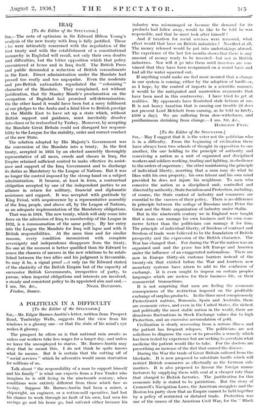A POLITICIAN IN A DIFFICULTY
[To the Editor of the SPECTATOR.] SIR,—Mr. Edgar Barnes-Austin's letter, written from Prospect Road, Tunbridge Wells, suggests that the view from his windows is a gloomy one—or that the state of his mind's eye makes it gloomy.
The prospect he offers us is that national ruin awaits us unless our workers take less wages for a longer day, and unless we leave the unemployed to starve. Mr. Barnes-Austin may deny that he meant this. I do not think he quite knows what he means. But it is certain that the cutting off of " social services " which he advocates would mean starvation for millions of us.
Talk about " the responsibility of a man to support himself and his family " is what one expects from a Free Trader who imagines he is still living in the nineteenth century, when conditions were entirely different from those which face us to-day. Suppose Mr. Barnes-Austin had been a miner, a shipwright, an engineer, or a cotton-mill operative, had lost his chance to work through no fault of his own, had seen his savings go and his home go, had suffered either because his
industry was mismanaged or because the demand for its products had fallen away, would he like to be told he was responsible, and that he must look after himself'.'
And if taxation for social services were removed, what effect would that have on British industries ? No effect at all. The money released would be put into undertakings abroad. The experience of the last few months shows that there is any amount of money ready to be invested—but not in British industries. Nor will it go into them until investors are con- vinced that they have been reorganized on a sound basis and had all the water squeezed out.
If anything could make me feel more assured that a change in our system is coming, either by the adoption of tariffs or, as I hope, by the control of imports in a scientific manner, it would be the antiquated and marrowless arguments that have been used in this controversy. I have tried to get at realities. My opponents have flourished stale fictions at me. It is not heavy taxation that is causing our trouble (it does not prevent Lord Melehett from ear g, as he told us lately, £100 a day). We are suffering from slow-wittedness, and pusillanimous shrinking from change.—I am. Sir, &c., lissuvrox
































 Previous page
Previous page